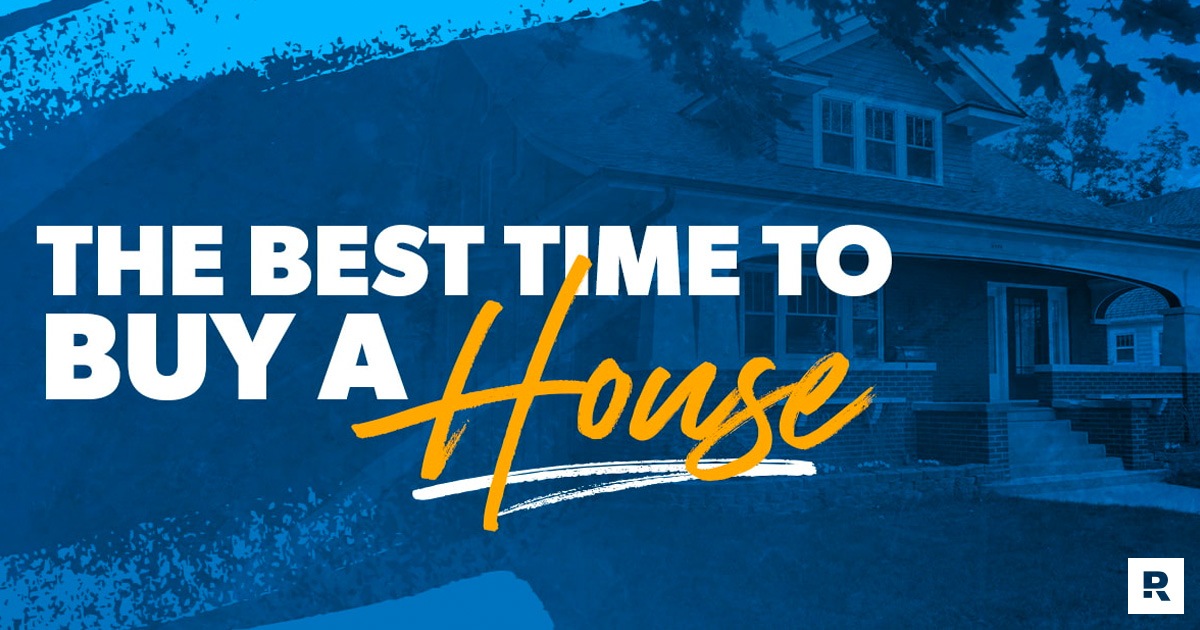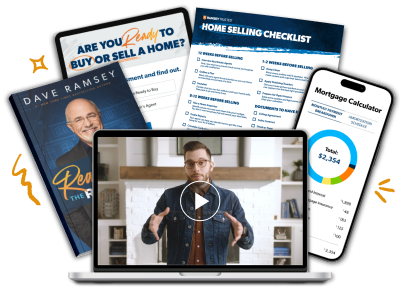When Is the Best Time to Buy a House?
8 Min Read | Aug 6, 2024

When you’re buying a house, wouldn’t it be awesome if you had the widest selection and the lowest prices to choose from? Kind of like Amazon.
That would be some sweet convenience! The problem is, finding a house is all about timing. And it can be a moving target to figure out when home prices will be low and the number of homes for sale (or inventory) will be high. And even if you had a crystal ball that told you the best time to buy a house, you’d have to be in the right place in your season of life and financial situation to do it.
That said, I want to help you feel confident about finding the best time to buy a house. As a personal finance expert, I’ve taught thousands of people how to navigate the home-buying process.
So buckle up. I’ll walk you through typical housing market patterns and show you how to know when you’re financially ready to buy a house. That way, you’ll be set up for success as you make one of the biggest purchases of your life.
Let’s do this!
What Is the Best Month to Buy a House?
Traditionally—and that means I’m excluding when the real estate market got super weird during the pandemic—the best month to buy a house is August or September. Home prices usually go down in late summer and early fall because there are fewer buyers and inventory is still pretty high after the busy spring selling season.
Your All-in-One Real Estate Resource
Find everything you need to help make confident decisions and reach your home goals.
Now you’re probably wondering: When is the worst time to buy a house? It’s spring. (April is the cruelest month . . . I’m waxing poetic). Spring is tough because tons of people are in the market to buy a home—and that means you’ll face more competition. Many home buyers, especially those with kiddos, want to buy a home in the spring so they can move in the summer and be settled down in time for the school year.
But keep in mind, no one can predict real estate trends with 100% accuracy. So never let what month it is make or break your home-buying decision—only your financial situation can truly determine the right time for you.
With that said, in 2023 the best time to buy a house was probably around September—when existing home prices had a nice drop of $11,300 and inventory was the highest it had been since the previous October. October 2023 wasn’t too bad either, with a small price drop of $1,000 and an increase in inventory of 20,000 homes.1
To see these trends for yourself, check out the chart below:
|
Month |
Home Price (Median) |
Inventory (Millions) |
|
October 2022 |
$378,800 |
1.22 |
|
November 2022 |
$372,700 |
1.12 |
|
December 2022 |
$366,500 |
0.96 |
|
Janurary 2023 |
$361,200 |
0.98 |
|
February 2023 |
$363,600 |
0.97 |
|
March 2023 |
$375,400 |
0.97 |
|
April 2023 |
$385,900 |
1.04 |
|
May 2023 |
$396,400 |
1.08 |
|
June 2023 |
$410,000 |
1.07 |
|
July 2023 |
$405,700 |
1.11 |
|
August 2023 |
$404,100 |
1.10 |
|
September 2023 |
$392,800 |
1.13 |
|
October 2023 |
$391,800 |
1.152 |
What Is the Cheapest Month to Buy a House?
Home prices are usually at their lowest in winter. In fact, according to the 12-month period in the table above, home prices were at their lowest in January 2023—at a median of $361,200. So if the best time to buy for you means getting the lowest price, be sure to slip on your warm woolen mittens before you go to showings.
See how much house you can afford with our free mortgage calculator!
Keep in mind, winter is usually hibernation time for real estate—fewer houses are for sale during the busy holiday season (not to mention some regions have the cold and snow to deal with). But less demand for homes could give you some bargaining power when it comes time to make an offer on a house.
In 2023, the number of homes for sale saw its greatest drop from November to December—losing 160,000 homes from the market!
Super low inventory could make it harder to find a home that has all the features you want. But no worries—who really needs a bowling alley anyway? (We can’t all live like we’re on MTV Cribs.)
Real Estate Advice Directly to Your Inbox
Enter your email to get monthly content that’ll help you navigate the market with confidence.
What Month Do Most Houses Go on the Market?
Most houses go on the market in the spring. In 2023, the national number of homes for sale shot up an additional 70,000 from March to April—the fastest rate of growth all year. That number kept growing into the summer and reached 1.11 million home listings by July. So, if a jacuzzi and an outdoor pizza oven are a must for you, spring and summer are the times to shop.
On the downside, spring and summer are also the busiest house-hunting seasons, so competition and prices will likely be at their highest. This year, home prices shot up $13,600 from May to June and reached their highest point of the year at $410,000. But if you can budget for it, it’s often worth shopping when there’s an abundance of homes on the market to choose from.
Is Now a Good Time to Buy a House?
Since most real estate data points and housing market predictions point toward home values continuing to increase over the next few years, it’s better to buy now rather than later. But it really depends on your financial situation (more on that later).
The good news is home prices aren’t shooting up as fast as they were in the past few years. And with higher mortgage rates removing some buying competition, buyers with all their ducks in a row could benefit from buying a house in the current market.
But Really . . . The Best Time to Buy Depends on You
Sure, you can try timing your home purchase just right to find the widest selection or pay the lowest price. But really, the best time to buy is when your finances are in order.
Here are the biggest signs you’re ready to buy a house:
- You have zero debt and a big fat emergency fund. The biggest expenses that get in the way of people saving for a home purchase are all debt-related: student loans, credit card debt and car loans.3 Dump the debt and free up your income so you can afford your home adventure!
- Your house payment won’t be more than 25% of your take-home pay. This 25% limit includes principal, interest, property taxes, home insurance, private mortgage insurance (PMI) and homeowners association (HOA) fees.
- You’ve saved up a big down payment. Taking out a mortgage with a super low or no down payment will have you paying so much extra in interest and fees and keep you in debt for decades. Sure, it’s not popular to slow down and save up a bigger down payment. But it’ll protect you from a lifetime of stress and money fights in the long run.
- You know how to choose the right mortgage. A 15-year fixed-rate conventional loan will save you the most money, and it’s the only type of mortgage I recommend. Beware of fancy (expensive) mortgage products like ARM, FHA, VA, USDA and even 30-year loans. They’re designed to help people who really aren’t financially ready to buy a house get one anyway—and then pay through the nose for it over the next few decades in the form of extra interest and fees. P.S. If you want to learn more about these different mortgages, I break it all down in a simple and fun way in my new book, Breaking Free From Broke.
- You can handle homeownership costs. Depending on the age of the home you buy, you could end up having to tackle several home maintenance projects in a year, costing hundreds to thousands of dollars. When you buy a house instead of rent, there’s no more landlord to fix things for you. Also, moving into a bigger space usually means your utility bill will be higher too—so make sure you can budget for these things.
- You plan on staying put for a while. All the up-front costs and work you’d put into getting a house probably won’t be worth the small amount of value you’d gain by living in it for only a short amount of time. But if you love your city and plan to stay put for at least three years, buying a house is a great investment!
If each of those statements sounds like you—congrats!—now could be the best time for you to buy a house.
Next Steps
- Figure out your home budget by using our home affordability calculator.
- Get the ball rolling by getting preapproved for the right mortgage.
- Find an experienced real estate agent who knows your market like the back of their hand. For a quick and easy way to find agents in your area, try our free RamseyTrusted program.


